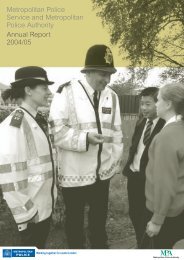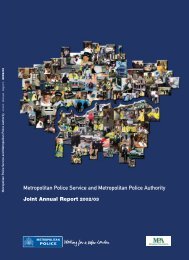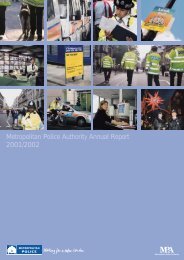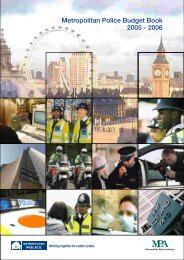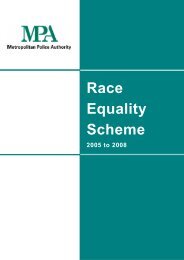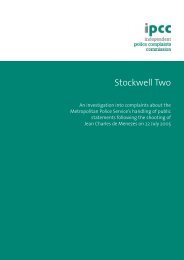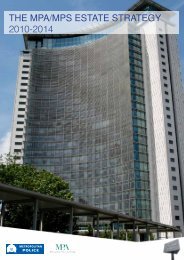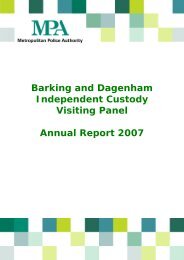Final Report of the Morris Inquiry: The Case for Change
Final Report of the Morris Inquiry: The Case for Change
Final Report of the Morris Inquiry: The Case for Change
Create successful ePaper yourself
Turn your PDF publications into a flip-book with our unique Google optimized e-Paper software.
BUILDING CAPACITY<br />
<strong>the</strong>re is a direct and vital link between per<strong>for</strong>mance and <strong>the</strong> way an organisation obtains <strong>the</strong><br />
best people and develops <strong>the</strong> knowledge, skills and attitudes <strong>of</strong> those new recruits and <strong>of</strong><br />
existing staff.” (MPS Dignity at Work Guidance and Best Practice.)<br />
“Everyone has learning and development needs <strong>of</strong> some kind, regardless <strong>of</strong> <strong>the</strong>ir role or rank<br />
– although development needs differ in different situations.”<br />
(MPS Per<strong>for</strong>mance Development Review.)<br />
9.55 An effective appraisal system <strong>for</strong> all <strong>of</strong>ficers and staff is key to identifying <strong>the</strong>se<br />
development needs:<br />
“<strong>The</strong> per<strong>for</strong>mance <strong>of</strong> our work<strong>for</strong>ce is critical in achieving <strong>the</strong> business objectives <strong>of</strong> <strong>the</strong> OCU.<br />
An opinion is <strong>for</strong>med and our per<strong>for</strong>mance is measured at every interaction and transaction.<br />
It is essential to respond positively and with confidence to <strong>the</strong> needs <strong>of</strong> an organisation and<br />
an OCU going through perpetual change, and <strong>the</strong> skills, knowledge and development <strong>of</strong> <strong>the</strong><br />
work<strong>for</strong>ce is mission critical in keeping pace and meeting <strong>the</strong>se demands.”<br />
(Submission from <strong>the</strong> Child Protection Command.)<br />
9.56 <strong>The</strong> HMIC inspection <strong>of</strong> <strong>the</strong> MPS <strong>for</strong> 2000/2001 found that “too many<br />
HR processes are bureaucratic; <strong>for</strong> example, it requires enormous time and ef<strong>for</strong>t to apply<br />
<strong>for</strong> promotion or selection <strong>for</strong> specialist posts, to complete appraisals and to apply to join<br />
<strong>the</strong> MPS.”<br />
9.57 Since this inspection, <strong>the</strong> HR Directorate has <strong>for</strong>mulated its People Strategy,<br />
which includes <strong>the</strong> use <strong>of</strong> Per<strong>for</strong>mance Development Reviews (PDRs) to assess and<br />
build upon <strong>the</strong> strengths <strong>of</strong> individual <strong>of</strong>ficers and staff, and <strong>the</strong> Career and<br />
Retention Unit as part <strong>of</strong> <strong>the</strong> Directorate <strong>of</strong> People Development.<br />
9.58 However, AC Hogan-Howe told us that “<strong>the</strong> ‘People Strategy’ does not appear to<br />
have met <strong>the</strong> expectations that were evident at its launch. <strong>The</strong> six main strands remain relevant,<br />
but <strong>the</strong>y appear not to have been embraced by <strong>the</strong> organisation and implementation is<br />
perceived to be slow and patchy”, and that processes <strong>for</strong> appraisals, career development,<br />
and promotion systems are regarded in <strong>the</strong> organisation as relatively ineffective.<br />
9.59 Concern was expressed by <strong>the</strong> HMIC in its latest inspection report<br />
(2002/2003): “<strong>The</strong> credibility <strong>of</strong> appraisal processes in <strong>the</strong> MPS is poor and effective<br />
implementation <strong>of</strong> <strong>the</strong> new per<strong>for</strong>mance development review (PDR) process will be crucial.<br />
Local training was being delivered on some <strong>of</strong> <strong>the</strong> BOCUs visited during <strong>the</strong> Inspection.<br />
Un<strong>for</strong>tunately, because <strong>of</strong> competing training priorities and <strong>the</strong> limited availability <strong>of</strong> staff,<br />
trainers and classrooms with <strong>the</strong> necessary IT, <strong>the</strong>re was already a backlog <strong>of</strong> PDRs waiting to<br />
be actioned because supervisory staff had not been trained. In addition, some local trainers<br />
were not complimentary regarding <strong>the</strong>ir training and <strong>the</strong> corporate package which <strong>the</strong>y were<br />
expected to deliver. Her Majesty’s Inspector is concerned that <strong>the</strong>re appears to be limited<br />
central monitoring <strong>of</strong> <strong>the</strong> quality <strong>of</strong> local delivery, or evaluation <strong>of</strong> <strong>the</strong> impact <strong>of</strong> <strong>the</strong> training<br />
programme. Both <strong>the</strong>se issues should be addressed be<strong>for</strong>e <strong>the</strong> roll-out <strong>of</strong> <strong>the</strong> civil staff version<br />
in order that important lessons can be learnt.”<br />
213



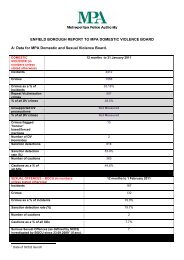
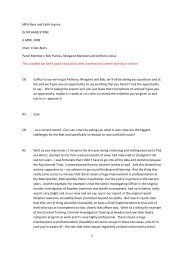
![Appendix 1 [PDF]](https://img.yumpu.com/51078997/1/184x260/appendix-1-pdf.jpg?quality=85)
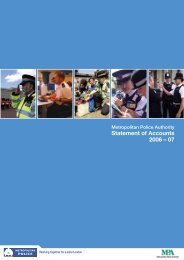
![Transcript of this meeting [PDF]](https://img.yumpu.com/50087310/1/184x260/transcript-of-this-meeting-pdf.jpg?quality=85)
![Street drinking in Hounslow [PDF]](https://img.yumpu.com/49411456/1/184x260/street-drinking-in-hounslow-pdf.jpg?quality=85)
